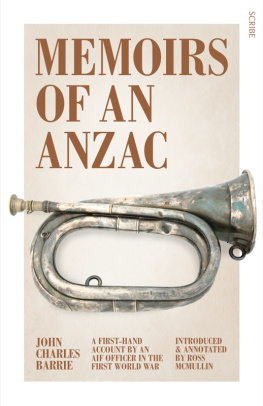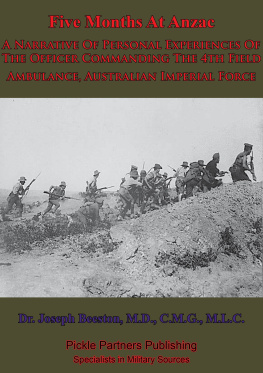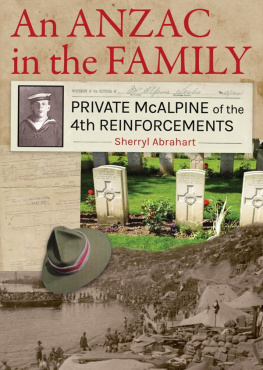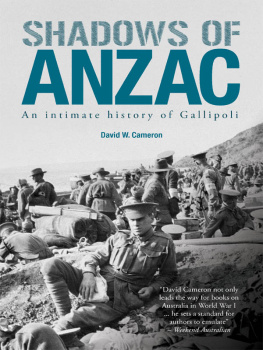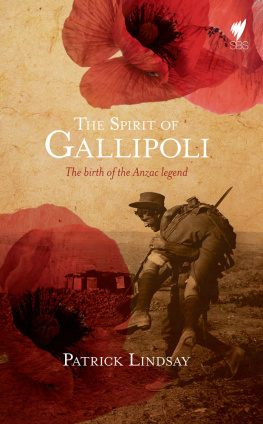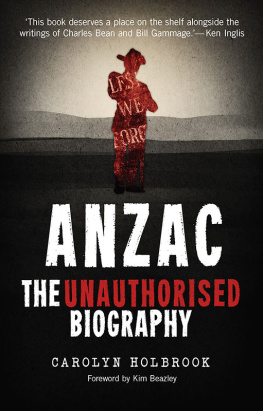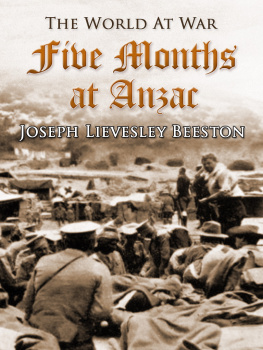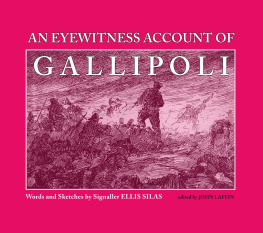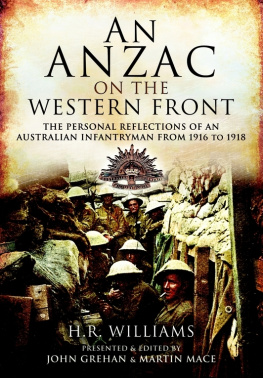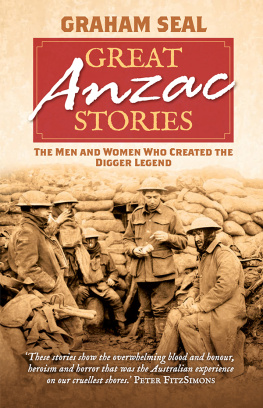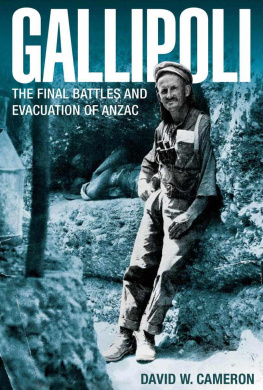
MEMOIRS OF AN ANZAC
Born in 1883, John Charles Barrie grew up in Victoria. He joined Australias militia in 1909, and remained an army man his entire life, retiring with the rank of colonel. An officer in the AIF from the start of World War I, Barrie was involved in the landing at Gallipoli, and later served at the Western Front. He was wounded twice during the war. Barrie died in 1957, survived by his wife and daughter. His memoirs have been made available by his granddaughter, Judy Osborne.
Ross McMullin is a historian and biographer who has written extensively about the impact on Australia of its involvement in World War I. Dr McMullins books include his biographies, the award-winning Pompey Elliott and Will Dyson: Australias radical genius. His most recent book, Farewell, Dear People: biographies of Australias lost generation , was awarded the Prime Ministers Prize for Australian History.
In loving memory of my mother, Isabel Ruff,
the daughter of John Charles Barrie
Judy Osborne
Scribe Publications
1820 Edward St, Brunswick, Victoria 3056, Australia
2 John St, Clerkenwell, London, WC1N 2ES, United Kingdom
First published by Scribe 2015
Text copyright Judy Osborne 2015
Introduction and notes copyright Ross McMullin 2015
All rights reserved. Without limiting the rights under copyright reserved above, no part of this publication may be reproduced, stored in or introduced into a retrieval system, or transmitted, in any form or by any means (electronic, mechanical, photocopying, recording or otherwise) without the prior written permission of the publishers of this book.
Cover photograph Australian War Memorial, RELAWM01070, Silver-plated Class A, Victor bugle engraved by subscribers: C Company, 13 Battalion AIF.
National Library of Australia
Cataloguing-in-Publication data
Barrie, John Charles, author.
Memoirs of an Anzac: a first-hand account by an AIF officer in the First World War / John Charles Barrie; introduction by Ross McMullin.
9781925106497 (paperback)
9781925113686 (e-book)
1. Barrie, John Charles. 2. Australia. Army. 3. Australian and New Zealand Army CorpsBiography. 4. SoldiersAustraliaBiography. 5. World War, 1914-1918participation, AustralianBiography. 6. AustraliaBiography.
Other Authors/Contributors: McMullin, Ross, writer of added text.
940.3092
scribepublications.com.au
scribepublications.co.uk
Contents
by Judy Osborne
by Ross McMullin
by Judy Osborne
Abbreviations in the text
A.I.F. Australian Imperial Force
A.M.C. Army Medical Corps
A.P.M. Assistant Provost Marshal
C.C.S. Casualty Clearing Station
C.M.G. Commander of the Order of St Michael and St George
C.O. Commanding Officer (sometimes reversed as O.C.)
C.S.M. Company Sergeant Major
D.C.M. Distinguished Conduct Medal
D.S.O. Distinguished Service Order
G.O.C. General Officer Commanding
H.E. High Explosives
M.C. Military Cross
M.L.O. Military Landing Officer
M.M. Military Medal
M.O. Medical Officer
M.S.M. Meritorious Service Medal
N.C.O. Non-commissioned Officer
Q.M.S. Quartermaster Sergeant (sometimes Q.M.)
R.M.O. Regimental Medical Officer (sometimes M.O.)
R.S.M. Regimental Sergeant Major
R.T.O. Railway Transport Officer
T.M. Trench Mortar
V.C. Victoria Cross
V.F.L. Victorian Football League
Formations in the military hierarchy
Formations, in descending order, are as follows:
Army
Corps
Division
Brigade
Battalion
Company
Platoon
Section
Preface
By Judy Osborne
I never met my grandfather Colonel John Charles Barrie, as he died a year before I was born, but I heard many tales of his adventures and achievements as a husband and father, a horseman, and an officer of the Australian Army in the First World War. He wrote this book in the 1930s, and I remember the much-cherished original manuscript being in my grandmothers care, and then my mothers, until she gave it to me some 25 years ago.
I read and enjoyed the book then, and, finally, I decided that 80 years was long enough for it to have been kept in the cupboard. Grandpas story is worth telling, and I want to share it.
Against his mothers wishes, my grandfather joined Australias militia in 1909, and had attained the rank of lieutenant when the First World War broke out in 1914 and he was appointed to the Australian Imperial Force. He was ready, willing, and able to embark on the HMS Benalla in October that year, which took him and the 8th Battalion from Port Melbourne to the shores of Gallipoli on that fateful first Anzac Day. His spirit saw him through this famous battle, and beyond.
Grandpa was not known as John, or even Charles. He was Charlie to most of his friends and family but, to my grandmother, he was Peter, because she said he was like Peter Pan, the little boy who never grew up (and, in fact, he was, and I am, related to Peter Pans author, J.M. Barrie). To his digger mates in the AIF, he was known as Dan, and this is his story.
Introduction
By Ross McMullin
I like soldiering, and duty was always a pleasure to me, J.C. Barrie writes in these illuminating recollections of his years in the AIF. Such attitudes can sound like platitudes, but Barries memoirs confirm that, in his case, these sentiments were genuine. An officer from the start of the war, Barrie was wounded at Gallipoli, and yearned to return to the front. But he found himself repeatedly frustrated, because during his recuperation he made himself indispensable in various training roles that he performed with characteristic diligence and effectiveness. It was harder to get to the war than away from it, he lamented. Eventually, though, he managed via distinctly unorthodox means to get back to his unit. He relished his association with comrades of like-minded conscientiousness, and was full of admiration and compassion for the men he led.
Barrie describes his experiences with verve and flair. Frank and forthright in his assessments of individuals and events, he chronicles unhackneyed anecdotes, is good at dialogue, and enjoys humour. But this is no frivolous exercise in avoidance of the ghastliness of the war. The reality of the conflict is depicted with vivid authenticity. Admired comrades die, or endure dreadful wounds; Barrie is severely wounded himself at both Gallipoli and France, and almost drowns in a quagmire of mud one dark night near Delville Wood.
Moreover, there is plenty here to interest specialists and aficionados who have read widely about the AIF in World War I. Accounts of the landing at Gallipoli routinely highlight the brave and selfless contributions made by British Navy personnel, so it is startling to read in these pages about a punch-up between an AIF officer and a British ship captain that stemmed from the Australians determination to prevent the apprehensive skipper from taking his ship away from the danger zone before its quota of the landing force had disembarked. Also, the story of four battalion commanders conspiring with an obliging doctor to use a dodgy diagnosis to remove an incompetent and obnoxious brigadier is superb. Other splendid vignettes include Barries description of Pompey Elliott playing football behind the lines in France. Barrie was something of a Pompey protg. He had been trained by Elliott in the pre-war militia, wanted to serve under him again in the AIF, and eventually did.
Barrie is scathing about someone else he served under, but does not name this commander. However, the officer concerned is identified in the footnotes I have compiled to accompany Barries recollections. The aim of these notes is to identify notable persons Barrie has mentioned but not named, to provide additional information about individuals who are significant in Barries memoirs, and to contribute elaborative context for some of the events he has described. Unless otherwise stated, place names in these notes are Australian, and the ages attributed to individuals in the notes relate to the time when they appear in Barries narrative (although military records often reflect what soldiers said their ages were, and are therefore not necessarily always accurate).
Next page
